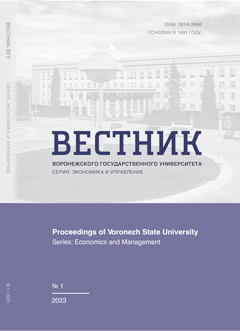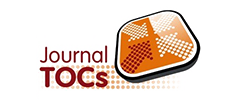Сущность и содержание логистического подхода к снижению продовольственных потерь
Аннотация
Предмет. Неотъемлемая часть благополучия государства выражается в его продовольственной безопасности. Улучшение обеспечения населения продуктами питания представляет собой важную социальную и экономическую задачи. Учет и контроль потерь сельхозпродукции и пищевых отходов является одной из важнейших составляющих устойчивого развития страны. Выявление предпосылок к разработке логистического подхода по снижению продовольственных потерь становится все более актуальным в сложившейся ситуации.
Цель исследования. Разработка основных принципов реализации логистического подхода к сокращению продовольственных потерь и их характеристика.
Методология. При написании данной статьи был применен системный подход, использовался статистический и теоретический методы исследования, также использовались информационные ресурсы баз данных Росстата, федеральные и региональные нормативно-правовые документы. Проведено изучение научной литературы отечественных и зарубежных авторов, сделан анализ научно-практических материалов.
Результаты. Применение логистического подхода на стадии производства, переработки, реализации и утилизации продуктов питания позволит на высоком уровне удовлетворять потребности людей в продовольствии без излишних потерь и порчи продукции.
Выводы. Логистика как новая концепция управления материальными и связанными с ними финансовыми и информационными потоками становится все более востребованной в отраслях агропромышленного комплекса. Инструментарий логистики является особенно эффективным в материально-техническом обеспечении и сбыте готовой продукции. Организация ресурсного обеспечения сельхозпроизводителей и продвижения их продукции на рынок на принципах логистики дает значительный экономический, социальный и экологический эффект. Одним из эффективных инструментов решения проблемы сокращения потерь и порчи пищевой продукции, а также более качественного обслуживания её конечных потребителей является логистический менеджмент.
Литература
Alferyev, V. (2006) On the resource supply of agriculture based on logistics and marketing. Economist. 6, 89–93. (In Russian)
Evteeva, E.V. (2011) Interrelation of logistics and information technologies of the organization. Bulletin of the V. N. Tatishchev Volga State University. 17, 21–24. (In Russian)
Ivanov, F. F. (2005) The introduction of modern logistics technologies in agricultural production is an important factor in the entry of the Republic of Belarus into the WTO. Problems of the economy. 4, 73–80. (In Russian)
Markarian, Yu.A., Shevchenko, E. I. & Klimenko, A. S. (2018) Logistics of goods supply in agriculture at the international level. Scientific and practical electronic journal Alley of Science. 3(19), 223–228. (In Russian)
Ogorodnikov, P I., Kolovertnova, M. Yu., Droshnev, V. V., Klyushin, D. I., Matveeva, O. B., Guseva, E. P. & Speshilova, I. V. (2015) Information systems of effective management of enterprises of the agricultural sector of the region in the conditions of uncertainty. Ekaterinburg, Institute of Economics of the Ural Branch of the Russian Academy of Sciences. (In Russian)
Ogorodnikov, P. I., Kolovertnova, M. Yu. & Guseva, E. P. (2016) The level of development of information technologies in the regions of the country on the example of the Orenburg region. The role and place of information technologies in modern science: a collection of articles of the International Scientific and Practical Conference. 119–123. (In Russian)
Tyapuhin, A.P. (2018) Logistics. Supply chain management. Moscow, KNORUS. (In Russian)
Tyapuhin, A. P. (2020) Logistika. Moscow, Yurayt. (In Russian)
Tyapuhin, A. P., Kolovertnova, M. Yu. & Shepelevich, S. S. (2020) Content of the logistics approach to enterprise management. Management in Russia and abroad. 3, 52–60. (In Russian)
Abdelradi, F. (2018) Food waste behaviour at the household level: A conceptual framework. Waste Manag. 71, 485–493.
Amani, P. & Gadde, L.E. (2015) Shelf life extension and food waste reduction. Proceed. Food Syst. Dynam. 7-14.
Arivazhagan, R., Geetha, P. & Ravilochanan, P. (2016) Assessment of wastages in fruit supply chain with respect to fruit processing units in Tamilnadu, India. International food research journal.23(2), 723–732.
Adarme-Jaimes, W., Orjuela-Castro, J. А. & Orejuela-Cabrera, J. P. (2019) Last Mile Logistics in Mega-Cities for Perishable Fruits. Journal of industrial engineering and management. 12(2), 318–327.
Adarme-Jaimes, W., Orjuela-Castro, J. А. & Orejuela-Cabrera, J. P. (2021) Logistics Network Configuration for Seasonal Perishable Food Supply Chains. Journal of industrial engineering and management. 14(2), 135–151.
Aschemann-Witzel, J., de Hooge, I., Amani, P. et al. (2015) Consumer-Related Food Waste: Causes and Potential for Action. Sustainabillity. 7(6), 6457-6477.
Balaji, M. & Arshinder, K. (2016) Modeling the causes of food wastage in Indian perishable food supply chain. Resources conservation and recycling. 114, 153-167.
Beausang, C., Hall, C. & Toma, L. (2017) Food waste and losses in primary production: Qualitative insights from horticulture. Resources conservation and recycling. 126, 177–185.
Calvo-Porral, C., Faina Medin, A. & Losada-Lopez, C. (2017) Can Marketing Help in Tackling Food Waste?: Proposals in Developed Countries. Journal of food products marketing. 23(1), 42–60.
Corrado, S., Ardente, F., Sala, S. et al. (2017) Modelling of food loss within life cycle assessment: From current practice towards a systematisation. Journal of cleaner production. 140 (2), 847–859.
Diaz-Ruiz, R., Costa-Font, M., Lopez-i-Gelats, F. et al. (2018) A Sum of Incidentals or a Structural Problem? The True Nature of Food Waste in the Metropolitan Region of Barcelona. Sustainability. 10 (10), 1–19.
Dora, M., Wesana, J., Gellynck, X. et al. (2020) Importance of sustainable operations in food loss: evidence from the Belgian food processing industry. Annals of operations research. 290 (1-2), 47–72.
Emana, B., Afari-Sefa, V., Mohammed, H. et al. (2017) Characterization of pre- and postharvest losses of tomato supply chain in Ethiopia. Agriculture and Food Security. 6(3), 1-11.
Fagunwa, O.E. & Olanbiwoninu, A. A. (2020). Accelerating the sustainable development goals through microbiology: some efforts and opportunities. Access microbiology. 2 (5), acmi000112.
Gardas, B., Raut, R., Jagtap, A.H. et al. (2019) Exploring the key performance indicators of green supply chain management in agroindustry. Journal of modelling in management. 14 (1), 260–283.
Kowalska, A. (2017) The issue of food losses and waste and its determinants. LogForum. 13 (1), 7–18.
Leng, K., Jin, L., Shi, W. et al. (2019) Research on agricultural products supply chain inspection system based on internet of things. Cluster computing-the journal of networks software tools and applications. 22, 8919–8927.
Magalhaes, V. S. M., Ferreira, L. M. D. F. & Silva, C. (2021) Using a methodological approach to model causes of food loss and waste in fruit and vegetable supply chains. Journal of cleaner production. 283. DOI: 10.1016/j.jclepro.2020.124574.
Raut, R. D., Gardas, B. B., Narwane, V. S. et al. (2019) Improvement in the food losses in fruits and vegetable supply chain - a perspective of cold third-party logistics approach. Operations research perspectives. 6, 100117.
Rodriguez, A., & Sanders, I.R. (2016) Colombian-Swiss Research to Help Feed the Planet: From Green Revolution to Microbial Revolution. Acta Biologica Colombiana. 21 (1), 297–303.
Wahlqvist, M. L. (2016) Future food. Asia Pacific Journal of Clinical Nutrition. 25(4), 706–715. DOI: 10.6133/apjcn.092016.01.
Copyright (c) 2021 Тяпухин А.П., Коловертнова М.Ю., Гусева Е.П.

Это произведение доступно по лицензии Creative Commons «Attribution» («Атрибуция») 4.0 Всемирная.























